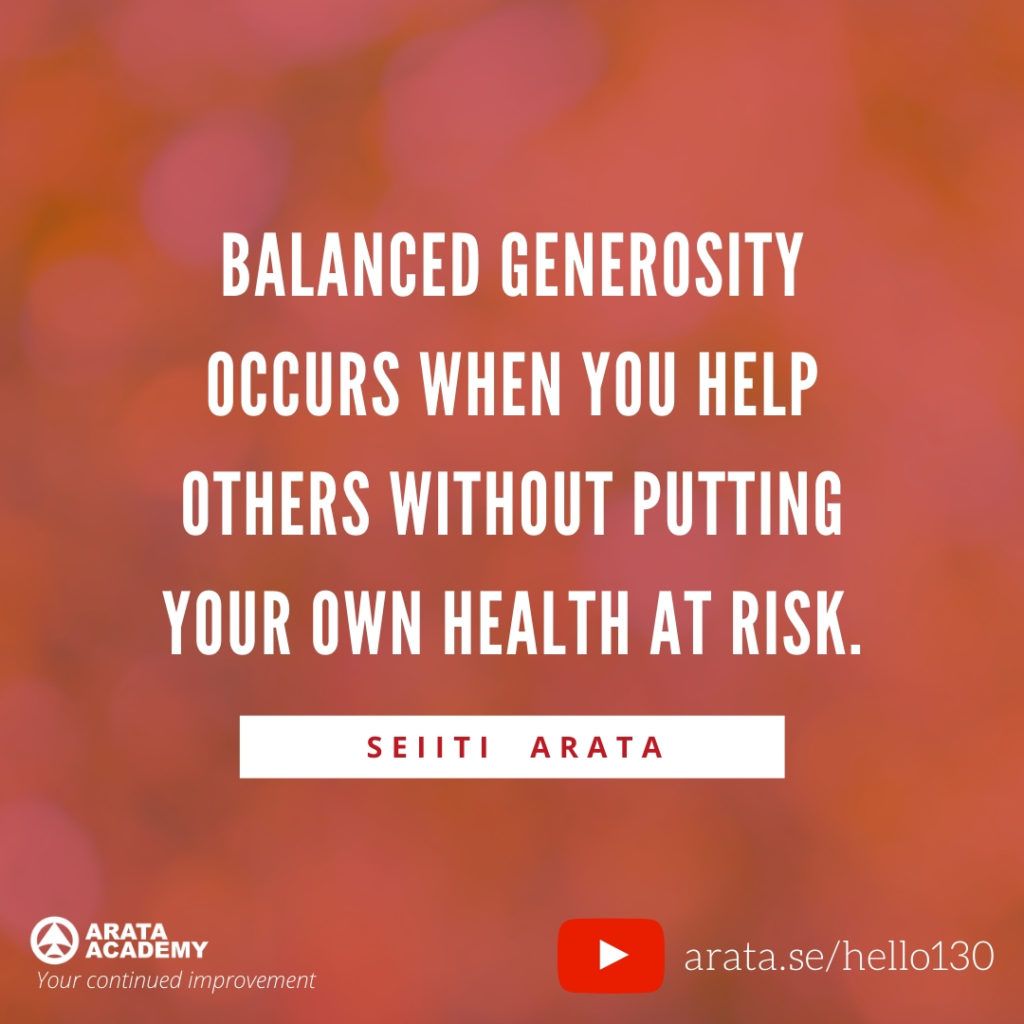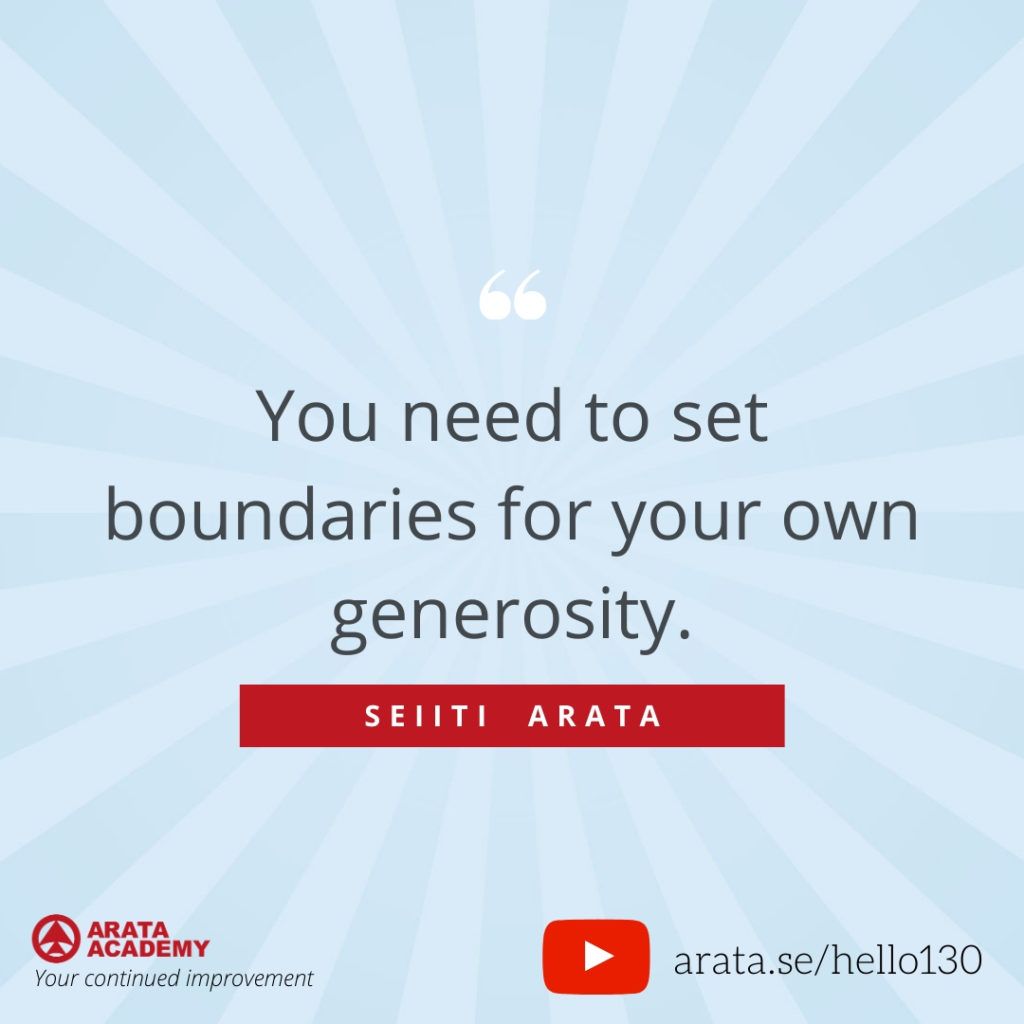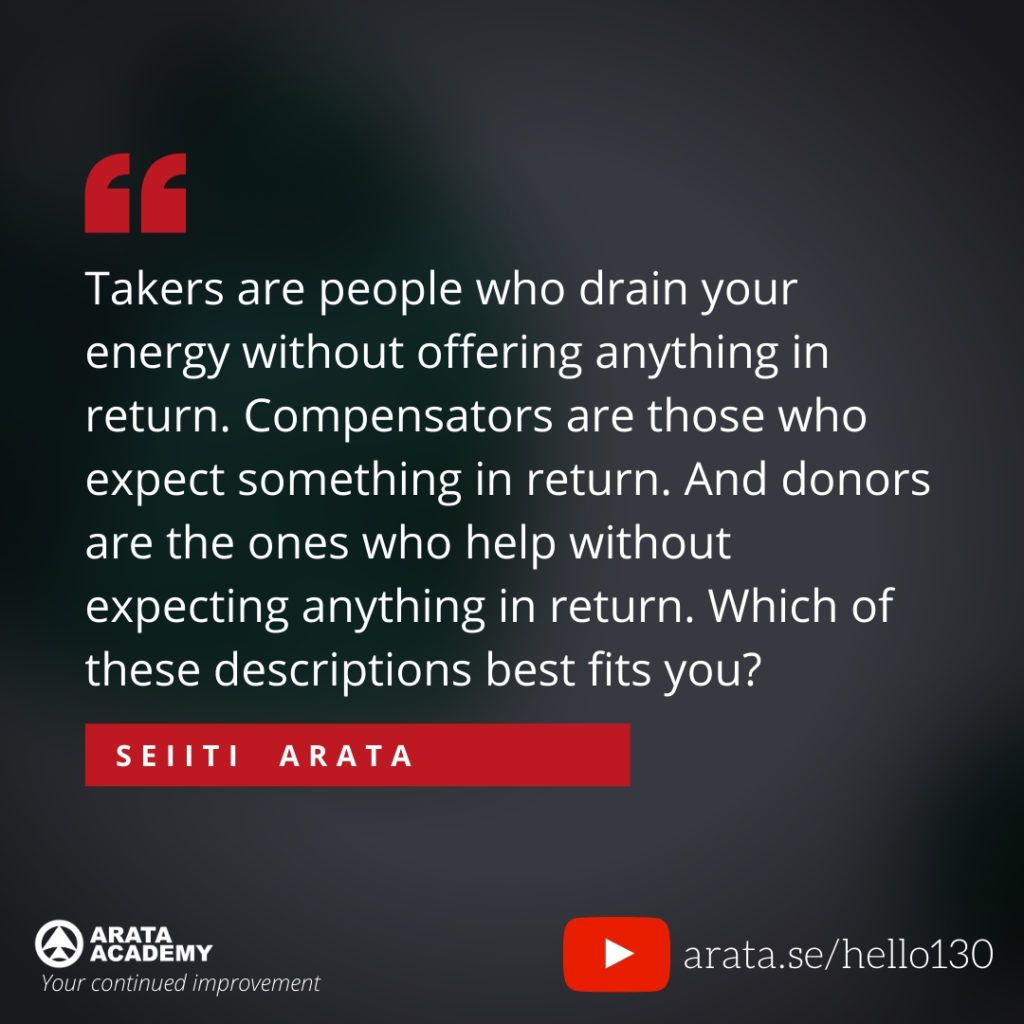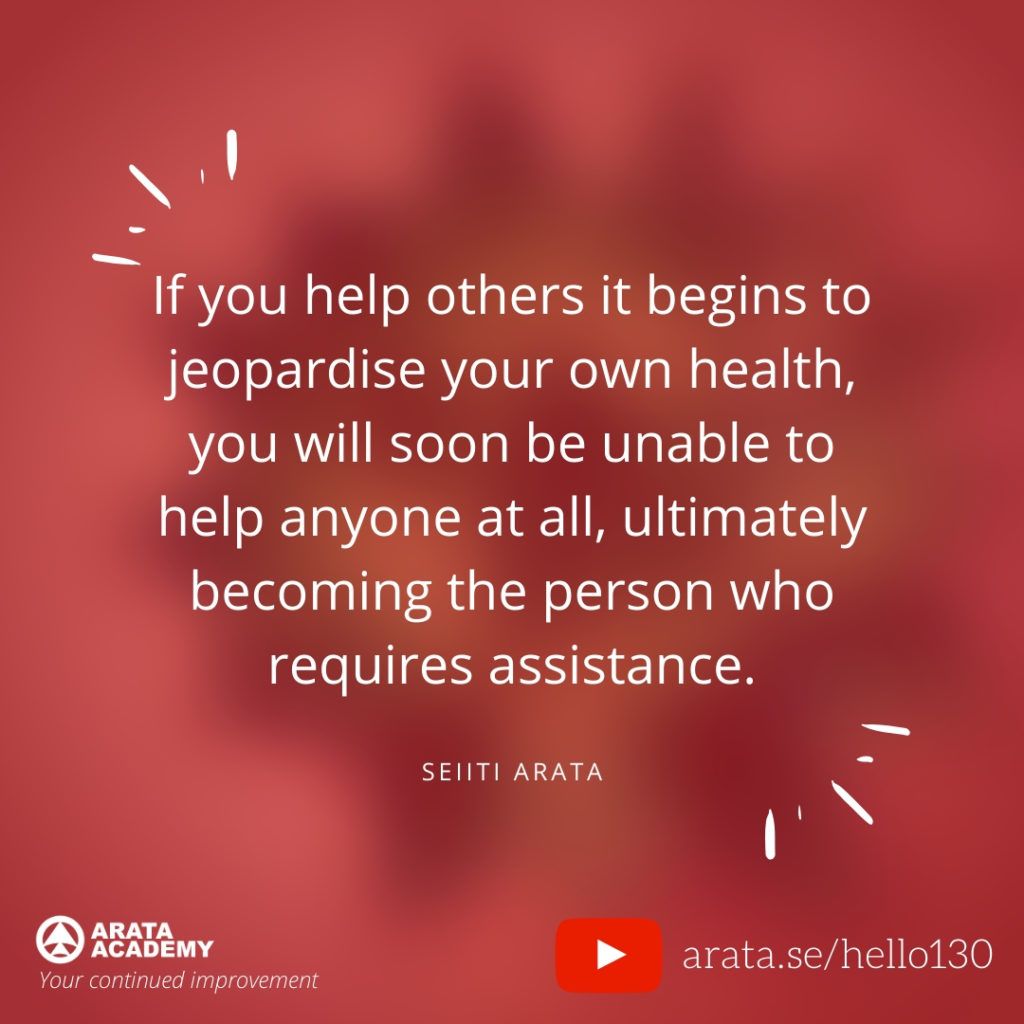Hello! Seiiti Arata. In some cases, generosity can cause anger or resentment because it is improperly managed. Do you know how to correctly manage your generosity? What should you do when someone tries to take advantage of your goodwill?
In general, being someone who is generous and willing to help others is a very good thing. Those who are generous can often build good relationships and achieve happiness and prosperity.
Generosity is also helpful in a working environment. Companies that have a culture of contribution have more unified teams that work better. Generosity brings better results on a corporate level.
But can being too generous end up hurting you? Are there not times when we dedicate ourselves so much to other people that we forget about ourselves? By trying to help some people too much, are we actually impeding their development?
Be careful not to get in the way of people’s opportunity to develop
When you misuse your generosity, you can get in the way of people’s opportunity to develop. For example, imagine that you are a generous teacher. You want to help your students succeed academically and professionally. You deliver the best class possible and do whatever the school board asks.
When class is over, after fulfilling all your obligations, you say that you are willing to answer any additional questions your students may have. You stay late at school, even if you get nothing for it in return.
Some students take this opportunity and start asking you to help them do activities that are not your responsibility as a teacher. For example, they ask you to help apply for scholarships, review employment resumes, and even help with other subjects. None of this is part of your responsibility as a teacher. However, unable to say no to requests, you stay late at school helping students with everything they come to you with.
On the one hand, you are practicing generosity. But on the other hand, you may be preventing students from learning new things. By doing the work for students, you are getting in the way of people’s opportunity to develop.

Teachers who help without setting a personal limit turn out to be teachers who ultimately have a poorer level of learning than their students.
But despite good intentions, students end up not performing well. In this example, are you really helping, or are you ultimately hindering students’ ability to learn how to solve problems on their own?
The case of the teacher who does more than they should is just one example. Think about your life and the times you helped in situations you shouldn’t have. Perhaps you also got in the way of someone’s opportunity to learn something useful on their own?
To be able to practice true, long-term generosity, first you need to know how to take care of yourself.
In addition to getting in the way of people’s opportunity to develop, misplaced generosity carries another risk. Too much generosity may be harmful to your health, your leisure and your rest time if you end up pushing your body beyond what it can cope with. This sacrifice will cause problems for you in the future.
So be careful when you are helping others without setting healthy boundaries for your generosity.
The intention of wanting to help at all costs is noble. This may be through sacrificing your personal time, spending extra nights and even taking weekends off in order to meet everyone’s demands.
In our training sessions, I talk in more detail about “Super Hero Syndrome”. Basically, it is a mistake to think that being generous means being available 24 hours a day, seven days a week. You do not need, and should not try, to act like a superhero. Being generous in a balanced way means knowing how to do things in moderation and respect healthy boundaries in order to take care of yourself and others.
To be generous in the long run, understand that the help you offer to others can only exist when you stay healthy.
A classic example of this principle is when you are on a plane. The safety procedure says that in an emergency, you first put the safety mask on yourself and only then help those around you. You have to set boundaries to help others without harming your own state of health and well being.
Otherwise, over time you may become physically and mentally depleted. You may even end up developing resentment towards the fact that you are helping everyone all the time, feeling that some people are taking advantage of your generosity.

This gets even worse when you realize that your efforts are not yielding positive results.
In healthcare, for example, it is common to see doctors suffering from compassion fatigue when they treat patients who cannot improve.
Seeing so much suffering whilst having compassion can cause healthcare professionals to suffer greatly. This suffering can even cause them to distance themselves emotionally from patients, have a personal crisis or even think about leaving the profession.
To avoid such situations, you need to understand the dynamics of generosity and to know the limits of your help.
You need to set limits of your generosity
To understand the dynamics of generosity, let’s use a concept from Adam Grant’s book Give and Receive, which divides people into three groups according to their ability to offer or ask for help. The three groups are takers, compensators and donors.
Takers are people who focus on what they can get from a relationship, people who are always looking for ways to move up the career path and exploit any benefits.
Takers are people who will take advantage of you if you do not protect yourself. Takers do not respect your limits and will ask for your help to do work for them.
There are also people who are looking for a balanced way to give and receive help. These are the compensators, or matchers. They are people who always expect give and take.
The compensators exchange favors. They give as much as they receive and always expect this exchange to take place. There is a transactional aspect.
Those who are compensators are uncomfortable, or even avoid receiving benefits when they realize they cannot contribute back. Thus the compensators can protect themselves from the takers because at some point they begin to avoid an unbalanced lifestyle.
Finally, there are donors or givers, people who focus on giving regardless of what they receive in return. They are people who help without expecting anything in return.
Within the group of donors, there are two subgroups: conscious donors, who set a limit for their own generosity, and unconditional donors who are always helping others despite it actually harming them in the long run.
Conscious donors understand their own needs and limits and also help others in a balanced way. Donors understand the importance of taking personal time to take care of themselves. The donors in this subgroup are generous but at the same time aware of their own limits.
Conscious donors say no when they are in an unsustainable situation, a situation that does not work for them. This is what we taught in the How To Say No course, which you can learn about by visiting arata.se/howtosayno
The non-limiting donor subgroup is made up of people who are always helping whatever the circumstances, often at great personal cost. Unlimited donors are always wanting to help others, even if it puts their own health at risk. Some people end up taking advantage of such generosity.
So be careful when being an unlimited donor. Helping others and forgetting yourself is not a healthy way to live life in the long run. Over time, personal sacrifice takes its toll in the form of emotional strain, completely burning out, or developing feelings of self resentment.
The problem with unlimited donors is that they have low levels of awareness regarding their own needs. Takers realize this lack of awareness and end up taking advantage of the generosity of unlimited donors, causing donors to work while the takers just relax.
Donors without limits ignore their own needs until they finally realize they are being disrespected. They then become exhausted or angry.
If they become exhausted, donors can no longer help others. If they get angry, donors create a kind of conflict, causing them to separate themselves from the relationship or fight, which also undermines the ultimate goal of being able to help others.
Relationships between those who only give and those who only take tend to be problematic
One dynamic that needs to be looked at is when a person with a taker profile is in a personal or professional relationship with a person with a donor profile. This relationship between takers and donors tends to escalate to the point where it creates problems.
One solution to this kind of problem within companies is to try to re-educate or simply get rid of people who fit the taker profile. Workers who just want to suck value from others have a high risk of being fired or suffering career stagnation.
In a moment, we will look at the criticisms of this theory, but first, let me ask a few questions. Should we simply discard people with a taker profile? Can’t we be generous and look for ways for these people to realize their shortcomings and thus improve?

Try to put yourself in the shoes of someone who is labelled as a taker. Have you ever wondered how it would feel if you were removed from a team for being unfairly classified as a person who is always draining? Maybe it takes a little more training or a heart to heart conversation in order to make you realize what you could do better?
Practice your generosity in a balanced way.
A simple way to prevent others from taking advantage of your generosity is to set aside specific time periods to contribute to other people’s lives and keep other particular blocks of time to take better care of yourself.
There is an experiment on generosity that divided participants into two groups
One group made a tiny contribution to other people’s lives every day, five days a week. Another group chose a specific day of the week to make various contributions to the lives of five people.
The group that made all the contributions on a single day a week had the most happiness. That is, helping several people in one day brings more personal satisfaction than helping a few people every day.
This is because if you devote a few minutes each day to helping others, it is not something that has a significant impact on how you perceive your own generosity.
But if you help several people in a single day, you are more likely to realize your generosity and that happiness will be perpetuated throughout the week.
Because of this, one scientific recommendation is that you choose one day of the week to help everyone who needs it all at once, rather than helping others just a little bit every day.
Another tip is that you find a way to prioritize. Some of the requests that come to you can actually be resolved by that person if they make a little extra effort. This makes people learn how to solve their problems independently.
Choose to help only when your personal contribution is most needed or in situations that really matter. And always try to help the person become more self-sufficient in the future. That is, give the fish but also teach how to use the fishing rod.
Also, try to be productive. Instead of helping one person at a time, see if there are ways in which you can bring more than one person together in the same environment, and when you help one, they all get the benefit. Perhaps one can focus on learning, then focus on helping another person by teaching it to them, thus multiplying knowledge and understanding.
It is also important to pay attention to the kind of person you are helping. Are these people worthy of your help or are they just taking advantage of your generosity?

You may even think that all human beings are worthy of compassion. Just remember that your time is limited. When you are helping someone who just wants to take advantage of you, you are failing to help someone who has better intentions.
Therefore, pay special attention to detect takers, deceivers, and other types of people who may deserve your attention less.
People who ask for your help in a healthy way are those who understand that they are taking up your time and because of that will try to be as efficient as possible, respecting your efforts and asking for help on something very specific. This will come after they have already worked hard to solve the problem on their own.
Someone who is a taker does not understand or respect this. The taker wants you to act immediately and do exactly what you are asked to do, often doing work that is not yours to do.
The taker is not flexible, and does not care about how things fit into your schedule. Rather, a taker wants you to be flexible to meet their needs.
When you see signs like these, you need to be assertive and know how to say no. Set your limits. For example, you might follow a kind of compensation system, where you demand that in order for you to help, the person does something in return. This may be something for you or for others.
We also need to increase our level of awareness and full presence. When we are able to understand our own emotional state and how we are truly feeling on the inside, we can better understand the balance needed to help others without great personal sacrifice on our own account.
Be careful when labelling people as takers, compensators or donors
A necessary criticism of the taker, compensator, or donor label is that in practice, it is never as simple as theory.
Depending on the moment, depending on the context, depending on the history I have with a particular person, I will end up behaving in a way that looks to give more or looks to receive more.
I can be a financially generous person who is always giving. At the same time, I may be in a loving relationship where I can be the kind of person who is constantly seeking to receive something.
Because of this, the caveat is that this model of dividing people into three groups is just a simplification to make it easier to understand. But simplification should not undermine the practice of generosity. If you go out classifying everyone as a taker and end up helping no one, the problem may not necessarily be with other people.
Each person has their own narrative that explains their own actions. If I can establish an honest conversation with someone who is considered a taker, then maybe you can understand what makes them this way. And with this understanding, I can try to help in a more in-depth manner, perhaps by helping the person to change their behavior.
A second criticism is that, unfortunately, our abilities of self-assessment are generally not very good. Virtually everyone who listens to this kind of conversation will say that they are the kind of people who are generous, who are donors. Very rarely will people will say that they are takers, that they are the kind of people who want to receive help at all costs.
The honest reason for this is that it is difficult for us to realize our own mistakes, to admit our character flaws. So think carefully before labelling yourself and others.
To carry out a better self-assessment, seek the anonymous opinion of others. For example, you can send acquaintances a link to an anonymous form where your friends, colleagues or family members can tell you what they think about your behavior. Ask if they think you give more than you receive or if you always want to receive more than you are willing to give. This anonymous feedback helps you get closer to reality.
Having compassion and generosity is an excellent personal trait. Helping others rids us of selfish thinking and often makes us realize how small our problems are compared to those of others, which helps diminish our own suffering. By helping others, we often end up helping ourselves.
This does not mean that generosity should be unlimited. Those who sacrifice taking care of themselves in order to help everyone else will soon have poor health and no time or resources left to help others.
If you do not protect yourself first and set limits on your generosity, your habit of helping can cause you to become overwhelmed, reducing your quality of life. So, instead of being able to help others, you will eventually become the person who needs help.
The keyword of our conversation today, therefore, is balance.
Now we all know how hard it is to deny help to someone in need. Knowing how to say no is certainly difficult, but like every skill, it is something that can be learned.
If you feel like you need more time in your life, are overworked, or that some people take advantage of your generosity, visit our “How to Say No” online training session by visiting arata.se/howtosayno

